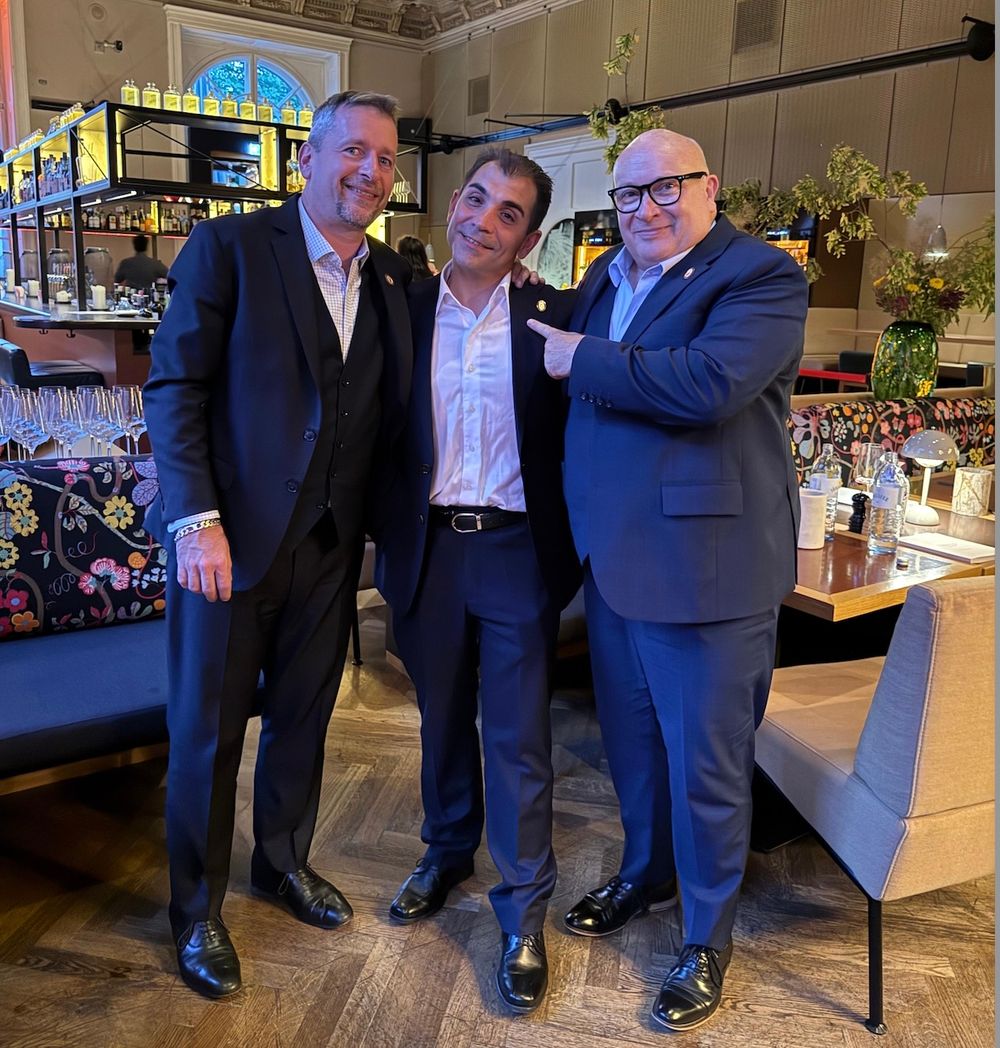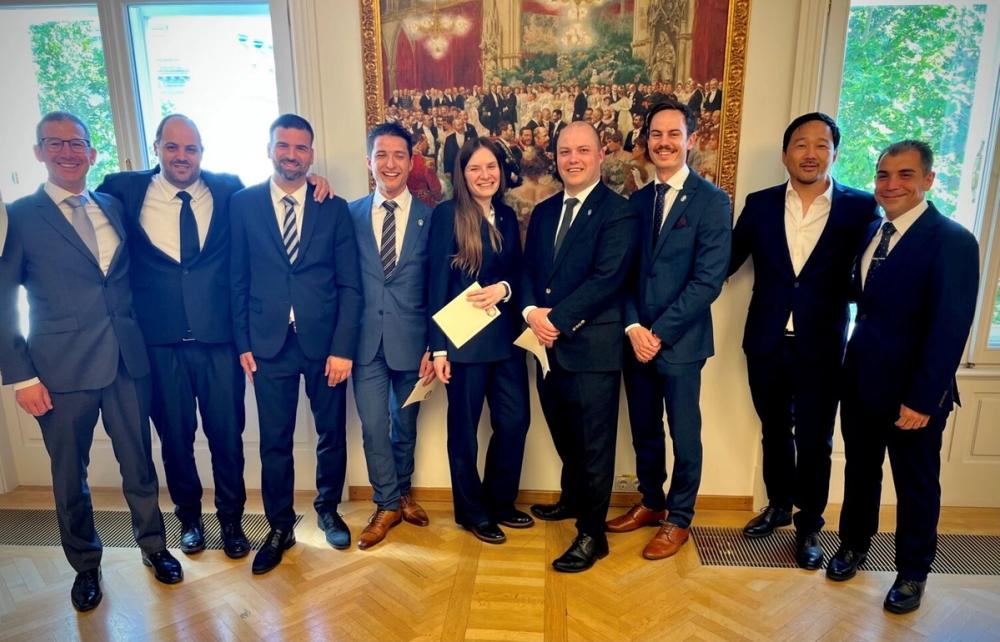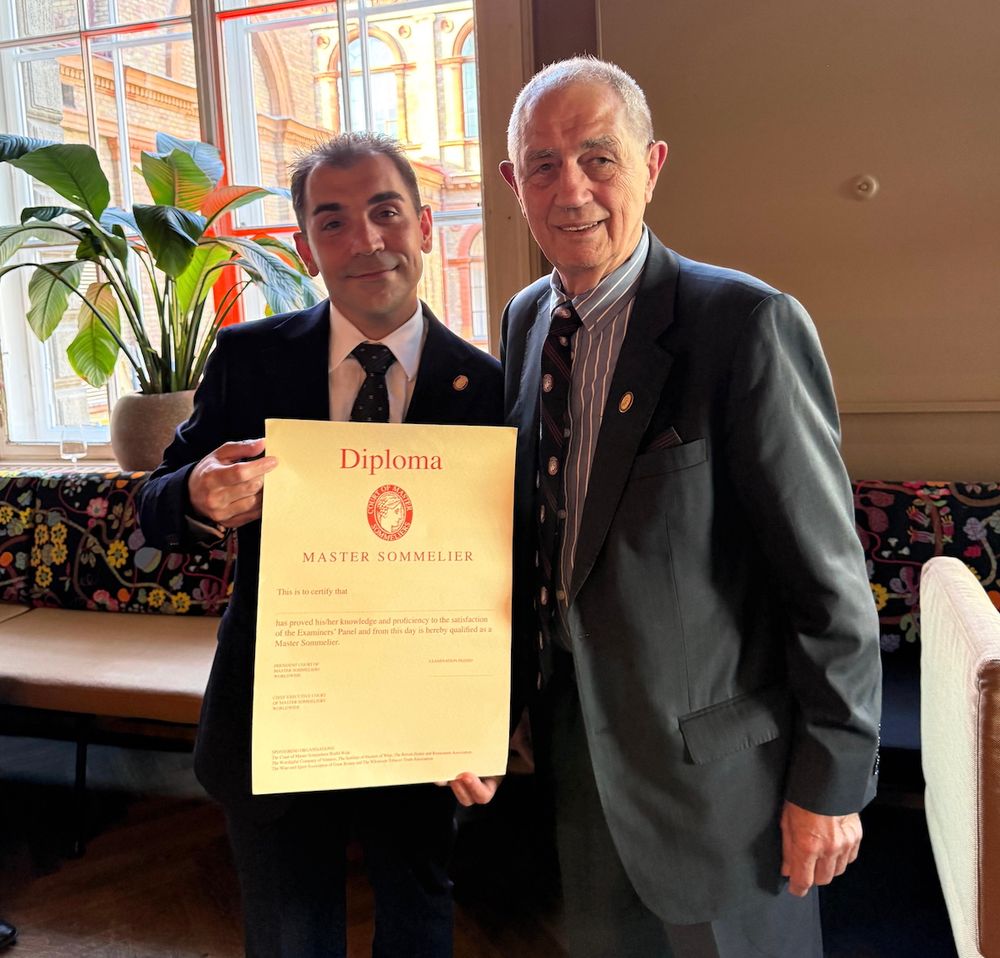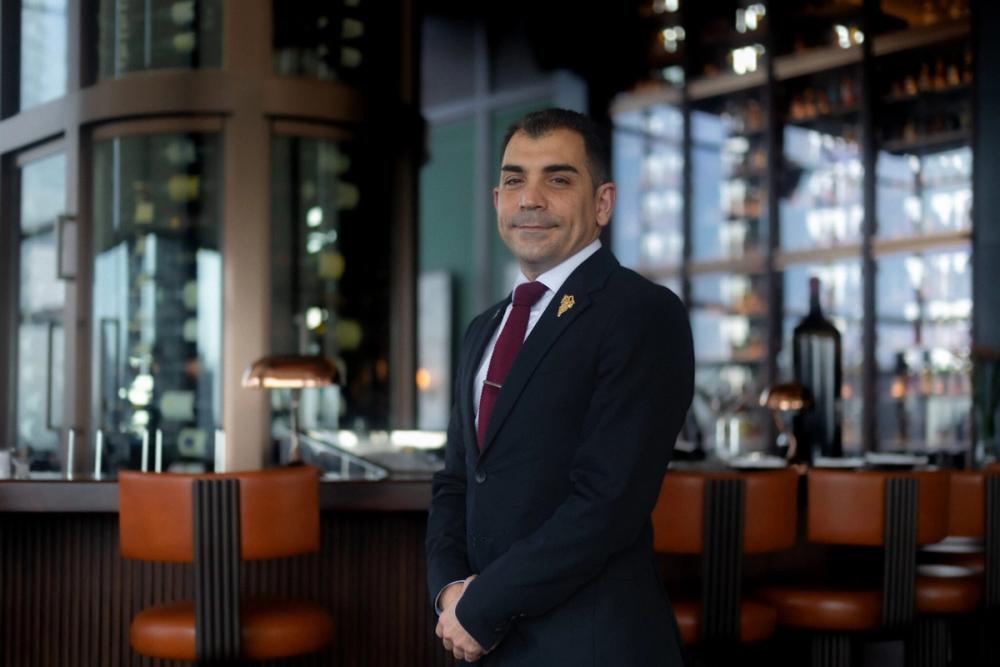Tell us about you got into wine and why you wanted to follow a career in wine?
I didn’t come from a hospitality background. I studied economics in Spain until I decided to take a break, and I came to Majorca to work in a restaurant during the summer, without any experience. As I always say: "A pretty nice accident."
What attracted you to being a sommelier?
Since I started working in hospitality, I was lucky to work with Miguel Angel Prieto, Sommelier of the Year in Spain 1997. I fell in love with wine—not only for its complex flavour but also for the combination of culture, family history, and the land where the grapes are grown.
I love the idea of guiding guests to discover something new that complements their meal or surprises their palate. It's a unique blend of hospitality, deep product knowledge, and history.
What has been your career to date as a sommelier - key steps along the way?
My career as a sommelier has been driven by a genuine passion for wine and a strong foundation in hospitality. From the very beginning, working in front-of-house roles, I discovered how much I enjoyed engaging with guests and sharing the magic of wine.
My first major opportunity in fine dining came in Barcelona at Mirror Restaurant, where I worked alongside celebrated chef Paco Pérez while completing my second year at university. This experience was truly transformative. I learned how to expertly pair wines with fine dining dishes and how to manage and curate a wine list that enhanced the overall guest experience in a luxury setting.
While studying at Barcelona University, I also completed WSET Levels 1, 2, and 3. Driven by my passion for sherry, I pursued further certifications through the sherry educator and sherry sommelier courses. Following that, I dedicated myself to preparing for sommelier competitions.
After my first attempt at the National Sommelier Competition Best Sommelier of Spain 2014 and coming second runner-up in Sommelier of the Year, I felt even more motivated to deepen my knowledge. I began closely following the Court of Master Sommeliers, staying up to date with its developments through social media.
Eager to further develop my skills and embrace new professional challenges, I was fortunate to join 67 Pall Mall under the esteemed mentorship of Ronan Sayburn MS.

Roberto Duran celebrates becoming a Master Sommelier with Ronan Sayburn MS and Dimitri Mesnard MS
His leadership, professionalism, and dedication to excellence profoundly influenced my development, teaching me the importance of teamwork, attention to detail, and continuous learning.
This opportunity marked a transformative milestone in my career as a sommelier, exposing me to one of the most rigorous and respected wine programs in the world.
Working under such a prestigious head of wine and within a luxury environment challenged me to elevate every aspect of my craft. From deepening my technical knowledge and refining my tasting abilities, to mastering the nuances of service and guest engagement in a high-pressure setting.
At 67 Pall Mall, I had the privilege of working closely with Terry Kandylis as head sommelier and Gareth Ferreira MS as assistant head sommelier. Together, we curated and managed an exceptional wine list featuring some of the world’s most iconic producers, which further broadened my understanding of fine wine and luxury hospitality.
This role also immersed me in a culture of excellence, where exceptional hospitality and a world-class wine program were at the core of everything we did.
The wine list included legendary producers such as Roumier, DRC, Gaja, Selosse, Leflaive, Lafite, Mouton, Vega Sicilia, Mascarello, and Biondi-Santi, among many others. One of the highlights was the rare and highly respected vertical of Giacomo Conterno Monfortino—one of the most impressive line-ups I have encountered.
Working in this esteemed setting provided invaluable exposure to managing and curating an extensive wine list for a discerning clientele. It sharpened my skills in pairing wines with fine dining menus and deepened my understanding of how to deliver truly memorable wine experiences. The role demanded meticulous attention to detail in every aspect - from cellar management and service execution to team education - all essential to delivering exceptional hospitality.
Alongside this practical experience, I also committed to the rigorous study program of the Court of Master Sommeliers. This training has significantly expanded my theoretical knowledge and enhanced my professional confidence. Covering viticulture, global wine regions, blind tasting, and service standards, the program refined my technical abilities and further strengthened my discipline, passion for learning, and commitment to mentoring others.
What was your initial training to be a sommelier?

Roberto Duran MW alongside the other new Master Someliers announced earlier this year
My initial training to become a sommelier was an exciting journey that started with hands-on experience in front-of-house roles, where my passion for wine and guest service truly took root. Eager to deepen my knowledge, I committed to formal education, completing a diploma in sommelier at Barcelona Hospitality, along with WSET Levels 1, 2, and 3. This combination of practical experience and structured learning gave me a strong foundation in wine theory, tasting, and service.
It also prepared me confidently to take on the Introductory and Certified Exams with the Court of Master Sommeliers.
What do you enjoy most about being a sommelier?
The opportunity to create memorable experiences for guests through wine. I love sharing stories about the origins of wines, the people who made them, and how they connect with food and culture.
It’s incredibly rewarding to guide someone to discover a new favourite wine or to elevate a meal with the perfect moment.
Every day brings a chance to learn something new.
What do you find the most challenging and how do you get around that?
One of the biggest challenges I’ve encountered as a sommelier is meeting the diverse tastes and expectations of different guests. Everyone’s palate is unique, and sometimes it takes extra effort to find just the right wine that truly delights them - especially during busy service.
However, I see this as an exciting challenge rather than a frustration. I focus on listening carefully to each guest’s preferences and asking the right questions to guide them thoughtfully.
Why do you want to train to be a Master Sommelier?
I was deeply passionate about reaching the highest level of expertise and professionalism in the wine industry. Becoming a Master Sommelier represents the pinnacle of knowledge, skill, and service. A goal that challenges me to push beyond my limits and grow in every aspect.
The dedication required to achieve this title is immense, but I believe the journey itself is just as valuable as the destination. This training will not only deepen my understanding of wine, service, and standards but also transform me into a more humble, knowledgeable human.
Ultimately, I aspire to inspire others through my expertise and commitment and contribute to elevating industry standards in Spain
What was the process like in terms of the difficulty and the time and dedication you need to put into the programme?

Roberto Duran is proud to be the first Master Sommelier in Spain
The process is undeniably demanding both in terms of time and mental focus. Preparing for the Master Sommelier programme requires a long-term mindset and a high level of self-discipline. It’s not something you approach casually; it becomes part of your daily routine and, in many ways, your lifestyle.
For me, the biggest challenge has been maintaining consistency across all three components - theory, tasting, and service - while still working full-time in a high-pressure environment.
Balancing study with the demands of a busy restaurant or wine program means you have to be extremely organised and intentional with your time. There’s no shortcut. You need to be studying every day, tasting regularly, and constantly refining your service skills.
The theory component alone is vast and always evolving. It requires you to go far beyond the basics, with a deep understanding of global wine regions, producers, viticulture, legislation, and beverage categories.
Blind tasting, meanwhile, is a skill that needs constant practices and honest feedback. It’s humbling. Some days go well, others don’t, but staying objective and building resilience is part of the process. And with service, the challenge is performing with calm confidence, even under exam pressure, while maintaining grace and professionalism.
What I’ve learned is that technical knowledge is only one part of it. Time management, mental endurance, emotional control, and having the right support network around you are just as important. It helps to be part of a tasting group, to have mentors who can give honest feedback, and to surround yourself with people who understand the intensity of the process.
In short, the difficulty is real, but so is the reward. The level of personal and professional growth that comes from preparing for the programme is huge. It forces you to raise your standards, sharpen your focus, and stay humble. It’s a long road, but if you’re committed, it’s also an incredibly fulfilling one.
What have you enjoyed the most about the training and education side of becoming a Master Sommelier?
The fact there is so much to learn every day. It’s been amazing to dive deeper into the world of wine - whether discovering new regions, tasting different styles, or mastering the finer points of service. I love the challenge of constantly improving and the excitement of uncovering something new about a bottle or a producer.
Another highlight has been the incredible people I’ve met throughout my career. They’ve helped me raise not only my knowledge of wine but also my understanding of life. Their support and shared passion have been truly inspiring
What did you find the most difficult and how do you manage to get over those difficulties?

Roberto Duran made his name as a sommelier at 67 Pall Mall where he wad head sommelier in London and then at its new restaurant and club in Singapore
The balance between the intense study and tasting demands with the everyday responsibilities of work and life.
To overcome these challenges, I focused on breaking down the material into manageable parts and setting realistic, consistent goals. Staying organised and disciplined with my study routine was key.
What advice would you give to other sommeliers who want to train to be a Master Sommelier - what are the key things they need to consider?
You need to prepare for a challenging but incredibly rewarding journey. First, it’s essential to have a strong foundation in wine knowledge and service skills before you begin, so invest your time in solid education and practical experience.
Discipline and consistency are key. Set a study schedule that works for you and stick to it, breaking down the vast material into manageable sections. Don’t underestimate the importance of tasting regularly with people who can support and challenge you, and practicing blind tasting outside of your comfort zone, as these are crucial components of the exams.
Mindset is just as important: stay patient, stay curious, and be resilient. Everyone faces setbacks and difficult moments, but persistence and a positive mindset will carry you through. Surround yourself with supportive mentors and peers, and never hesitate to ask for help - everyone on this path is happy to support you
What has it meant to you personally to become a Master Sommelier?
Becoming a Master Sommelier has been a deeply significant milestone in both my personal and professional journey. It reflects years of dedication, discipline, and a profound passion for wine that continues to inspire me daily.
Achieving this distinguished qualification has not only enhanced my technical knowledge and refined my skills but has also instilled a strong sense of confidence and fulfilment in my profession.
Beyond the technical expertise, this journey has profoundly shaped my character—teaching me resilience in the face of challenges, patience through the learning process, and the enduring value of lifelong education.
It is helping with your career and your job opportunities?
Yes, absolutely. Earning the Master Sommelier title has really opened up new opportunities for me. It’s such a well-respected qualification, and it definitely helps to build credibility and shows the level of dedication and knowledge you bring to the role.
But more than just a title, it’s been a great tool for growth. It’s helped me connect with more people in the industry and explore exciting new paths in hospitality and wine that I might not have considered before.
What are your ambitions now as a sommelier and where you want to work?
Looking ahead, I would love to be part of a dynamic, hospitality-focused team. That would ideally in a fine dining restaurant, group of restaurant, or where I can bring together high-level wine service, memorable guest experiences, and staff development.
Whether in Spain or abroad, I’m excited to share my passion, energy, and vision in a place where I can contribute to something great, while also continuing to learn and be inspired by those around me.
* You can find out more about the Master Sommelier programme at the Court of Master Sommeliers website here.






























